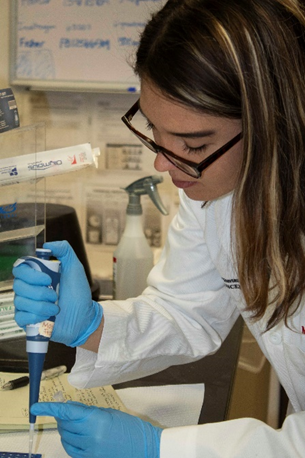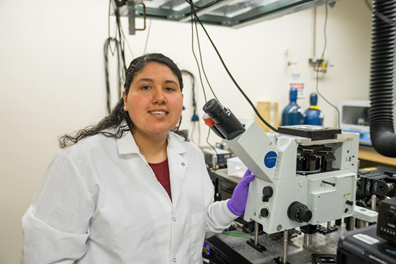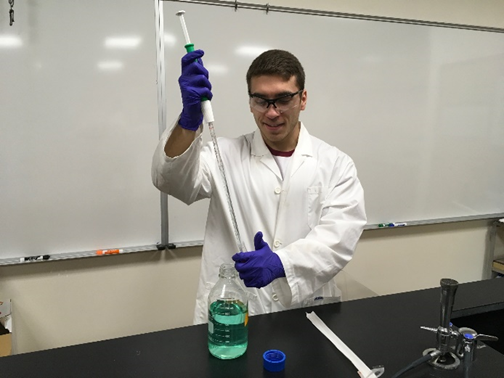Finding a career path in biomedical research can be challenging for many young people, especially when they have no footsteps to follow. We asked three recent college graduates who are pursuing advanced degrees in biomedical sciences to give us their best advice for undergrads.
Tip 1: Talk with mentors and peers, and explore opportunities.
One of the most challenging things for incoming undergraduates is simply to find out about biomedical research opportunities. By talking to professors and peers, students can find ways to explore and develop their interests in biomedical research.
 Credit: Michele Vaughan.
Credit: Michele Vaughan.Mariajose Franco, a first-generation college student, recently graduated with honors and dual degrees in molecular and cellular biology and physiology from the University of Arizona in Tucson. She’s now in a postbaccalaureate program at the National Cancer Institute and has her eye on combined M.D.-Ph.D. programs.
As an undergraduate, a course in cancer biology piqued her interest, and she reached out to her professor, Justina McEvoy, to see if she could join her lab. As a sophomore, Franco began working on rhabdomyosarcoma, a rare childhood cancer that arises from cells that normally develop into skeletal muscle. Through the NIGMS Maximizing Access to Research Careers (MARC) program, she received support to conduct two research projects during her junior and senior years. In addition to offering research opportunities, the MARC program was instrumental in providing training in scientific writing and conference poster presentations, and navigating applications, Franco says.
“Talk to people and do some research to become more informed about the opportunities that are available,” she adds. “I didn’t become involved in research until my sophomore year because I didn’t know those opportunities were available. In fact, I didn’t really know that you could get involved in research as an undergraduate.”
Tip 2: Go to conferences.
 Credit: Rosa Romero.
Credit: Rosa Romero.When Rosa Romero started her undergraduate studies at California State University San Marcos, the only exposure she’d had to careers in science was from watching forensic scientists on TV shows. “Since I’m a first-generation college student, I didn’t even know careers in biomedical sciences existed,” she says.
During her junior year at Cal State San Marcos, Romero joined the MARC program, which provided funding for her to attend the Annual Biomedical Research Conference for Minority Students. There, she presented a poster about her biophysical research and was approached by the associate director of molecular biophysics and biochemistry at Yale University in New Haven, Connecticut, who encouraged her to apply for a summer research program.
Cut to a few months later, and Romero was at Yale, helping to design and build a microscope. “That’s when I started to realize that I really liked instruments and biophysical techniques,” she says. That led her to a doctoral program in biochemistry at the University of Michigan Medical School, which she’s starting this fall. Romero is quick to credit MARC: “If it wasn’t for the program, I wouldn’t have discovered the thing that I really want to do.”
For undergraduates aiming for graduate school, start researching programs early, Romero advises, and try to meet with program representatives at conferences. “It’s an interesting experience trying to figure out what programs are best for you,” she says. “Looking at school websites is one thing, but visiting and meeting people can give you a whole other vibe,” she says.
Tip 3: Take your time.
Although some, like Romero, go straight to graduate school after college, sometimes it makes sense to gain additional work or research experience first.
 Credit: Hunter McCurdy.
Credit: Hunter McCurdy.Hunter McCurdy got his start in research working in a parasitology lab at Casper Community College, through the Wyoming IDeA [Institutional Development Award] Networks of Biomedical Research Excellence program . After transferring to the University of Wyoming in 2015, McCurdy worked in another lab developing synthetic spider silk proteins. “The research really helped me in school because I was actually applying what I was learning in the classroom,” he says.
McCurdy sought work experience after graduating with a bachelor’s in physiology in 2017. He became a medical scribe in the local emergency room, where he gained some clinical experience. “You can learn about illness in a textbook, but seeing it present is totally different,” he says. “It was very enlightening.”
The experience helped McCurdy decide to go to medical school rather than graduate school. This fall, he’s heading to Yale School of Medicine. Ultimately, he’d like to work in underserved places, whether it’s internationally for Doctors Without Borders or at home in rural Wyoming.
“Take your time. You don’t want to rush into this,” McCurdy says. “I wanted to give myself the best shot possible. In my experience interviewing, they look favorably upon students who take some time to get real-life experience. That shows you are actually committed to the path that you’re on.”
NIGMS Career Development Resources
Career development is a continual process—one in which you’ll never stop growing and learning. NIGMS has resources to support biomedical scientists from the high school to faculty level. To learn more about what it’s like to work as a researcher or how to become one, check out the resources on our Being a Scientist webpage, as well as our research training and career programs.

